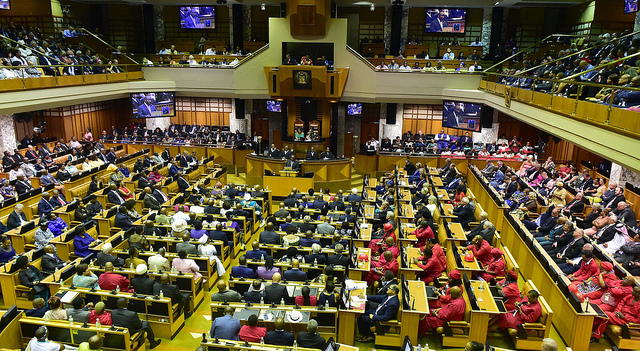“If the EFF wins the elections,” President Cyril Ramaphosa said during the opening of parliament on Thursday, “and he (Julius Malema) is installed as the president of South Africa, then he will invite me to come up stage and sing for him.”
Ramaphosa was referring to the song by the late Hugh Masekela — Thuma Mina — the theme of his inaugural state of the nation address in 2018 and his first year in office — which he said Malema had dared him to sing during his initial address.
A year later, Ramaphosa chose that anecdote to disarm the firebrand leader during the most watched political event in SA.
A week earlier, the red berets had threatened to disrupt the speech and press Ramaphosa for answers should he fail to come clean on a donation to his campaign to become ANC president from Bosasa, now Africa Global Group.
In the days leading up to the speech, there was widespread speculation as to whether the president will be allowed to finish his speech. Instead, the EFF sat quietly, awkwardly smiling, listening to the caretaker president wade through issue after issue.
There was no grand admission of colluding with Gavin Watson and Angelo Agrizzi and co. But there was also no disruption and the opening of parliament was anything but a question and answer session. The closest thing to a disruption was when EFF deputy Floyd Shivambvu briefly stood up and raised a concern of possible plagiarism of his party's manifesto.
Ramaphosa said he met Malema by accident on Wednesday, where they reached the agreement of a performance should the EFF emerge victorious at the polls in May. But Malema seemed pleasantly surprised by the anecdote - if his laughing before the punchline or his post SONA explanation for sitting quietly through all of it is anything to go by. (Malema claimed the president did give an explanation on TV, perhaps forgetting that his deputy told journalists they were considering disrupting the address only hours earlier).
The hard part was over. All that was left was a two hour long technical summary of all of SA's most pressing matters — something the EFF had to sit through like angry children during an NG chruch ceremony. Only they had laughed at the opening of the sermon. They had been disarmed and any animosity would appear petty.
Ramaphosa's ‘politics of public politeness’ is undoubtedly what wins him favour with the business community and a vital weapon in his arsenal against the opposition. It is also a crucial campaigning tool. But while it may save him from embarrassment and secure loud cheers from crowds, substance will be key to his long term success.
The president is a likable politician, unlike his predecessor, who seemed to derive joy from irking the opposition. Thursday's state of the nation address was not only a good presentation, but a detailed look at the key challenges and opportunities. It was technical to the extent that it might be described as boring. There was no drama, little disruption, and a few MPs even felt calm enough to sleep through it all (perhaps not everyone finds Ramaphosa charming).
Herein lies the president's greatest challenges and opportunities. Ramaphosa is already known as the president that shifted the focus of SA's political discourse back to the real issues, as opposed to conspiracy theories against ministers and bureaucrats and tit-for-tats between state officials.
But now that SA is focused on moving the country forward again and repairing the damages inflicted by the Zuma administration, Ramaphosa will have to deliver — not in terms of setting up talk shops or indabas. Commissions of inquiry need to result in arrests and prosecutions and dismissals, and investor conferences need to result in economic growth and job creation.
Yes, Ramaphosa has already made key changes and appointments during his first year in the Union Buildings. The drive to secure investment and repair the criminal justice system to effectively fight corruption has seen more advances in the last year than the previous nine combined. However, appointments, deals and investigations mean little if they meet the same end as those set up during the previous administration.
South Africans need jobs. Children can no longer drown in toilets at their schools, and all should have access to quality education. Vulnerable patients can't die due to negligence and corruption. Officials need to be held accountable for their crimes. Land actually needs to be redistributed. Communities need access to services and they should feel safe. Politics of this nature is a game of showing as opposed to telling.
Light-hearted introductions will count for little if the opposition is able to turn all of Thursday's promises into ammunition in a year's time. Should the president's promises remain theoretical, he may very well have thrown his own ticket for a second term out the window.
